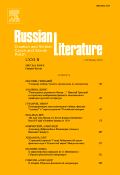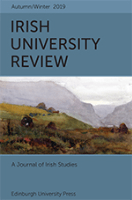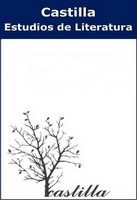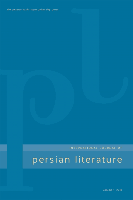
ItinerArios-Revista de Literatura
Scope & Guideline
Advancing Scholarship in Literary Traditions
Introduction
Aims and Scopes
- Interdisciplinary Literary Analysis:
The journal publishes works that apply diverse methodologies to literary criticism, including psychoanalysis, postcolonial theory, feminist criticism, and intertextual studies, allowing for multifaceted interpretations of texts. - Focus on Portuguese Language Literature:
The scope emphasizes literature written in Portuguese, exploring works from Portugal, Brazil, and other Portuguese-speaking nations, thereby promoting a broader understanding of Lusophone literary traditions. - Cultural and Historical Contextualization:
Articles frequently contextualize literary works within their socio-political environments, examining themes such as colonialism, migration, and identity, which are pivotal in understanding the evolution of literary narratives. - Exploration of Marginalized Voices:
The journal highlights works that discuss marginalized perspectives, including those of women, racial minorities, and LGBTQ+ authors, thus contributing to inclusive literary discourse. - Emerging Literary Trends:
ItinerArios actively engages with contemporary literary trends, particularly in relation to digital literature and new forms of storytelling, reflecting the evolving landscape of literary creation.
Trending and Emerging
- Postcolonial and Migratory Literature:
There is an increasing focus on postcolonial narratives and the experiences of migration, reflecting global movements and their impact on identity and culture, as seen in various studies of literature from former colonies. - Feminist and Gender Studies:
The journal has seen a rise in articles addressing feminist perspectives and gender studies, emphasizing women's voices and experiences in literature, which aligns with broader societal movements advocating for gender equality. - Digital Literature and New Media:
Emerging themes include the exploration of digital literature and the influence of new media on storytelling, indicating a growing interest in how technology reshapes literary forms and reader engagement. - Afrofuturism and Intersectionality:
The rise of Afrofuturism and intersectional studies highlights the blending of speculative fiction with cultural identity, offering new frameworks for understanding literature within the context of race and futurism. - Cultural Memory and Trauma Studies:
Recent publications have increasingly engaged with themes of cultural memory and trauma, examining how literature reflects and addresses historical injustices and collective memories, particularly in post-pandemic narratives.
Declining or Waning
- Traditional Literary Canon:
There has been a noticeable decline in the focus on traditional literary canon pieces, with fewer articles dedicated to classic authors or canonical texts, suggesting a shift towards contemporary and diverse narratives. - Naturalism and Historical Literature:
The interest in naturalism and historical literary critiques appears to be waning, as fewer publications explore these themes, indicating a possible shift towards more modern or experimental literary forms. - Purely Theoretical Criticism:
The journal seems to be moving away from purely theoretical discussions without practical applications, as more articles emphasize the relevance of literature in contemporary contexts rather than abstract theoretical frameworks.
Similar Journals

RUSSIAN LITERATURE
Cultivating Scholarly Excellence in Russian LiteratureRUSSIAN LITERATURE is a premier academic journal published by ELSEVIER, dedicated to advancing the study of Russian literary traditions, critical theory, and cultural contexts. With an ISSN of 0304-3479 and an E-ISSN of 1878-3678, this journal has firmly established itself as a vital resource in the field, achieving a commendable Q1 ranking in Literature and Literary Theory as of 2023. The journal benefits from a strong impact factor and ranks #178 out of 1106 in the Scopus database, placing it in the 83rd percentile of arts and humanities research. RUSSIAN LITERATURE covers an extensive timeline, converging years from 1971 to 1974 and from 1976 to 2023, reflecting its rich academic lineage. Although not an open-access publication, the journal remains influential among scholars, professionals, and students seeking in-depth analyses and critical insights into Russian literature and literary theory. Its commitment to scholarly rigor makes it an essential read for anyone engaging with the complexities of literary studies.

Forum for World Literature Studies
Navigating the Rich Tapestry of World LiteratureForum for World Literature Studies, published by KNOWLEDGE HUB PUBL CO LTD, stands as a pivotal platform within the humanities, particularly in the realms of Cultural Studies and Literature and Literary Theory. Established in 2009, this academic journal has quickly ascended to a prestigious Q1 ranking as of 2023, reflecting its significant impact in advancing scholarly discourse. With an impressive Scopus ranking—165th out of 1106 in Literature and Literary Theory, and 548th out of 1304 in Cultural Studies—it offers a critical space for researchers, professionals, and students dedicated to exploring the relationships between literature and cultural phenomena. Operating out of Hong Kong, the journal provides a rich selection of peer-reviewed articles that delve into global literary trends, making it an essential resource for anyone wishing to contribute to or deepen their understanding of world literature. With the prospect of open access options enhancing its accessibility, the Forum for World Literature Studies invites submissions that challenge conventional interpretations and foster innovative thinking in literary studies.

Anales de Literatura Espanola
Cultivating a Global Community of Literary EnthusiastsAnales de Literatura Espanola is a premier academic journal established by UNIV ALICANTE, dedicated to the exploration of Spanish literature and its multifaceted theories. Marked by its Open Access policy since 1982, the journal promotes the dissemination of knowledge to a global audience, enhancing accessibility for researchers, educators, and students alike. With a robust impact factor reflecting its academic rigor, it has achieved a commendable rank of Q2 in the field of Literature and Literary Theory for 2023, placing it among the upper echelon of literary journals. The journal has undergone significant evolution over its converged years from 2019 to 2024, adapting to contemporary discourses and facilitating interdisciplinary dialogues. Additionally, its position in the Scopus rankings underscores its relevance, holding a rank of #686 out of 1106 in the Arts and Humanities sector. Published out of Alicante, Spain, it welcomes submissions that contribute to the understanding of literary practices and cultural narratives, making it an essential resource for scholars and literary enthusiasts keen on expanding their knowledge within this vibrant field.

Taller de Letras
Connecting Scholars through Literary ExplorationTaller de Letras is a renowned academic journal published by the Pontificia Universidad Católica de Chile, specifically from the Faculty of Letters. With an ISSN of 0716-0798, this journal holds a significant position in the field of Literature and Literary Theory, enjoying a commendable Q2 quartile ranking as of 2023. It operates under the auspices of a prestigious institution, promoting high-quality scholarly discourse within its scope, which spans a wide array of literary studies. Although the journal does not offer Open Access, its contributions are pivotal for researchers, professionals, and students seeking to enhance their understanding of contemporary literary trends and theories, establishing a critical dialogue within the literary community. With coverage extending through a converged lifespan from 2011 to 2024, Taller de Letras continues to be a valuable resource for those engaged in the vibrant fields of literature and criticism.

IRISH UNIVERSITY REVIEW
Exploring the Depths of Irish Literary HeritageIRISH UNIVERSITY REVIEW is a distinguished academic journal published by Edinburgh University Press, specializing in the fields of Literature and Literary Theory. With an ISSN of 0021-1427 and an E-ISSN of 2047-2153, this journal serves as a vital platform for scholarly discourse on contemporary and historical literary studies related to Ireland and its cultural contexts. Located in the United Kingdom, the journal has achieved an impressive Q2 ranking in the 2023 category of Literature and Literary Theory, placing it in the 81st percentile among peer-reviewed arts and humanities journals globally, as per Scopus rankings. IRISH UNIVERSITY REVIEW is committed to fostering academic excellence and offers a range of access options for its readers, promoting both traditional and digital scholarship. With a publication timeline extending from 2002 to 2024, the journal is dedicated to enhancing understanding and appreciation of Irish literature through critical essays, reviews, and innovative research, making it an essential resource for researchers, professionals, and students alike.

Castilla-Estudios de Literatura
Innovating Literary Scholarship for a New Era.Castilla-Estudios de Literatura is an esteemed academic journal published by EDICIONES UNIV VALLADOLID, dedicated to the exploration and analysis of literature and literary theory. With an ISSN of 1989-7383 and an E-ISSN of 1989-7383, this journal has provided Open Access content since 2009, ensuring wide accessibility to its scholarly materials. Hailing from Spain, specifically based at JUAN MAMBRILLA 14, VALLADOLID 47003, SPAIN, it has become a notable platform for researchers and scholars, achieving a respectable Q3 ranking in the 2023 category of Literature and Literary Theory, along with a Scopus rank of #637 out of 1106 in the Arts and Humanities. Covering a converging period from 2013 to 2024, this journal embraces a diverse range of literary analysis, aiming to foster critical discourse among academics, professionals, and students globally. Its commitment to high-quality research and open dissemination makes it an invaluable resource for those engaged in the literary field.

NEUE RUNDSCHAU
Cultivating Insights into Artistic ExpressionNEUE RUNDSCHAU is a prominent journal published by S Fischer Verlag GmbH, specializing in the fields of literature and literary theory, as well as visual arts and performing arts. With its roots tracing back to its inception in 1969, this journal has evolved significantly, providing a platform for critical discourse and innovative scholarship in the arts and humanities. Although it experienced coverage changes, the journal remains a vital resource for researchers and academics, contributing to the rich dialogue surrounding cultural studies and artistic expression. Furthermore, while it is not available through open access, NEUE RUNDSCHAU offers essential insights into contemporary literary trends and artistic movements, ensuring its relevance and importance within the academic sphere. With Scopus rankings including a position in the 16th percentile for literature and literary theory, and a 10th percentile placement in cultural studies, the journal embodies a commitment to quality scholarly contributions, making it an invaluable asset for students, professionals, and researchers alike.

International Journal of Persian Literature
Navigating the Landscape of Persian Literary TraditionsWelcome to the International Journal of Persian Literature, a premier academic publication dedicated to advancing the field of Persian literary studies. Published by PENN STATE UNIV PRESS, this journal serves as a vital platform for scholars and researchers interested in the rich tapestry of Persian literature and its theoretical underpinnings. With an ISSN of 2376-5739 and E-ISSN 2376-5755, it has established its place within the academic community, earning a category ranking of Q3 in Literature and Literary Theory, as well as a commendable Scopus rank of #481 out of 1106. Spanning the years from 2016 to 2023, the journal invites contributions that explore Persian literary texts, cultural contexts, and theoretical frameworks, fostering enriched dialogue and understanding. Although it does not currently offer Open Access, researchers and students alike are encouraged to engage with its content, which represents a significant contribution to the ongoing scholarship in the field.

452 F-Revista de Teoria de la Literatura y Literatura Comparada
Connecting emerging voices with established literary scholarship.452 F-Revista de Teoria de la Literatura y Literatura Comparada is a prestigious academic journal published by the Universitat de Barcelona, Faculty of Philology, dedicated to advancing the field of literature and literary theory. With an E-ISSN of 2013-3294, this Open Access journal has been freely accessible since 2009, ensuring widespread dissemination of knowledge across the global literary community. Recognized for its scholarly contributions, it attained a Q2 ranking in the Literature and Literary Theory category as of 2023, placing it in the top tier of publications in its field. The journal covers a broad spectrum of topics within literary theory and comparative literature, inviting submissions from emerging and established scholars alike. Based in Barcelona, Spain, the journal bridges cultural and academic dialogues, positioning itself as an essential resource for researchers, professionals, and students aiming to deepen their understanding of contemporary literary dynamics.

LITTERATURES
Illuminating the Intersections of Theory and TextLITTERATURES is a distinguished academic journal dedicated to the exploration of literature and literary theory, published by UNIV TOULOUSE MIRAIL. With its ISSN 0563-9751, this journal provides a platform for innovative research and critical analysis in the humanities, particularly within the field of literature. Although currently not indexed with an official e-ISSN and with a history of coverage discontinued from Scopus from 2004 to 2015, LITTERATURES continues to contribute valuable insights and scholarly discourse in contemporary literary studies. Researchers will find its publications vital for examining the intersections of literary theory and practice, while students and professionals can benefit from its rigorous academic contributions. While the journal's Scopus rank places it within the 14th percentile among literature journals, its focus on French and international literature enriches the global literary landscape and encourages meaningful scholarly exchange. The journal is based in Toulouse, France, and invites contributions that challenge existing paradigms and inspire new interpretations within the realm of literature.